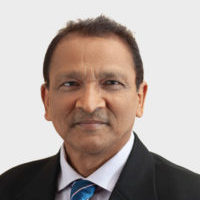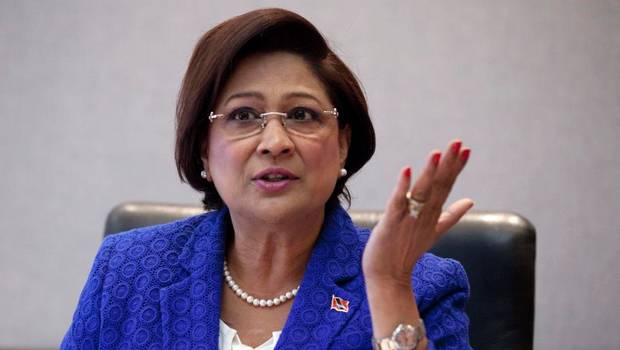Although due in 2020, general elections in Trinidad and Tobago seems to be in the air. The signs are loud and clear.

Kamla Persad-Bissessar. Photo credit: CNC3 TV
Prime Minister Dr Keith Rowley’s recent two-night yagna [discourse] was nothing more than a political campaign speech disguised as an address to the nation cunningly paid by the State with taxpayers’ money. On Thursday of the same week, Rowley continued his theatrics at the symbolically-named Exodus Pan Yard in the marginal constituency of Tunapuna. These “addresses” were triggered by the crushing decision by Sandals to withdraw from the proposed hotel project in Tobago.
The real, undisclosed reason why the international hotel brand pulled out was because it expects Rowley’s ruling People’s National Movement (PNM) to call elections soon and be defeated. Sandals did not want to deal with a new government which would have to continue to pay the estimated TT$3 billion investment to complete construction in 4-5 years. In her Facebook page (15/1/19), freelance journalist Marcia Braveboy was the first to have founded this theory.
Rowley is likely to call elections prematurely like his predecessor, Patrick Manning, did in 1995. Like Manning and his belief in priestess Juliana Pena of the Heights of Guanapo in 1995, Rowley seems to have gone politically berserk. His coarse, hostile, torturous, long, monotonous, non-stop, sometimes-three-hour rant is a clear symptom. In his Facebook page (17/1/19), freelance journalist Kevin Baldeosingh wrote that Rowley has lost “touch with reality (more succinctly – ‘he gone mad’).”
Baldeosingh believes that the turning point for Rowley was reached in his Sandals speech. He wrote: “Dr Rowley genuinely seems to think that everybody is deluded except him. Which, as you know, is the primary sign of madness.”
PNM won with narrow margins
The last general elections were held in September 7, 2015. The result was a contentious victory for the opposition PNM which received 52% of the vote and won 23 of the 41 seats in Parliament in a first-past-the-post electoral system. The PNM won with a mere margin of three (3) seats to become a minority government. Under a system of proportional representation as in Guyana, the PNM would be sitting precariously in power.
A PNM victory of 52% of the national vote was not much to celebrate. The PNM
should have won with a larger margin considering (i) the party was in Government for 49 (83%) of 59 years, (ii) it had built new blocks in marginal constituencies through housing schemes (pun intended), (iii) the PNM had padded the voter’s list with immigrants from up-the-islands and Nigeria, and (iv) it had spawned party cells in every government entity through employment of its supporters.
The PNM won the United National Congress (UNC) in the marginal constituencies of Moruga/Tableland, St. Joseph and Tunapuna by narrow margins of two (2%), nine (9%) percent and nine (9%) percent of the votes respectively. Incumbents Lovell Francis, Terrence Deyalsingh and Esmond Forde would surely be using legal and unethical means to retain power.
Had opposition forces united against the PNM in 2015, the UNC would have stayed in government. But there was heated war between the Independent Liberal Party (ILP) led by Jack Warner and the UNC, and a cold war between Congress of the People (COP) executive and the UNC. Indeed, the PNM did not have to campaign at all; the ILP did the dirty work for them.
A fight-alone approach is defeatist
Had these divisions not existed, as well as the stigma of corruption against the ruling UNC-led People’s Partnership (PP), the PNM would have been defeated. The PP/COP would have won the swing constituencies of Moruga/Tableland, St. Joseph, Tunapuna and San Fernando West.
History has shown that opposition unity is the only strategy to overthrow the PNM as Opposition MP Ganga Singh is articulating.
A fight-alone approach is exclusivist and fatalistic for opposition parties in plural societies like Trinidad, Guyana and Suriname. A united approach in the form of a merger, coalition or accommodation is sure to bring victory under UNC’s charismatic leader Kamla Persad-Bissessar. Egotistical politicians and opposition splinter parties who fail to work with the leader would die in history.
With all its house-padding and make-work programmes, the PNM is still likely to lose the next general elections. The UNC’s capture of Barataria in the local government by-election in July 2018 is a sign of the growing dissatisfaction with the government. The UNC increased its votes by 28 per cent in Barataria which was a traditional PNM seat since 2013.
Former PNM Minister Ralph Maraj wrote that the Sandals pull-out was “a fatal blow” to Rowley’s administration. “For it has brought greater gloom over his government which has achieved little or nothing in three and a half years … with an economy trapped in an obsolete paradigm, no new revenue streams, declining foreign reserves and mounting debt” (Express 20/1/19).
Dr. Mahabir was among 59 university (UTT) lecturers retrenched in May 2018.

is a full-time anthropologist at the University of Guyana (UG) and Fellow of The Eccles Centre for American Studies, British Library (2022-23). He is a former Assistant Professor at the University of Trinidad and Tobago (UTT). He obtained his Ph.D. in Anthropology from the University of Florida (UF). As a doctoral student, he won a Florida Caribbean Institute Award, an A. Curtis Wilgus Grant, and an Organization of American States (OAS) Fellowship.
Mahabir received a National Award (Hummingbird Silver Medal) for his contribution to education in his country in 2011. He was among 50 recipients who received a Distinguished Alumni Award from the UWI Alumni Association.
Mahabir is the author of 12 books to date.

